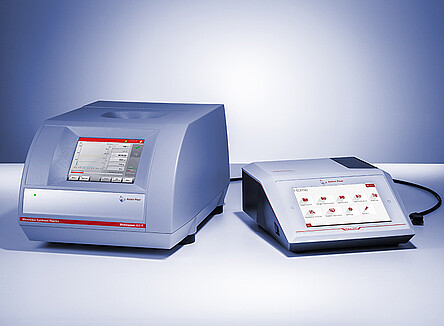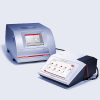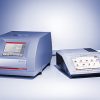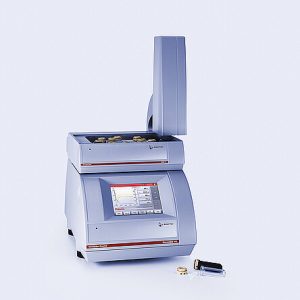Microwave Reactor with In-Situ Raman Spectroscopy:
Monowave 400 R
Combine Monowave 400 R with the Cora 5001 Raman spectrometer to receive a spectrum of information out of a former black box. Anton Paar combines two powerful techniques for synthetic chemistry – the microwave reactor Monowave 400 R delivers high-speed chemical reactions and the Raman analyzer Cora 5001 adds molecular spectroscopy for their characterization.
Gain a better understanding of reaction mechanisms and kinetics by combining precise temperature profiles with real-time information about the chemical composition of a reaction mixture. Optimize reaction conditions based on deeper insights, such as the influence of parameters, the role of different reagents, or detection of the ideal end point of a reaction.
Key features
Monowave 400 R provides the full range of operational parameters with temperatures of up to 300 °C and pressures of up to 30 bar. The Cora 5001 Raman analyzer performs time series measurements with adjustable intervals and exposure times during reactions, directly inside the reaction vial. The microwave reactor and the Raman spectrometer are connected via a special fiber-optic Raman probe.
Real-time in-situ reaction monitoring for a deeper understanding of reaction mechanisms
Raman spectroscopy provides direct identification of functional groups and quantitative information about the composition of a reaction mixture. Detect non-isolable intermediates or short lifetime transitional states with time-resolved measurements for a deeper understanding of reaction mechanisms.
Applications include:
- Identification of reactive intermediates
- Elucidation of reaction mechanisms
- Investigation of reaction kinetics
- Monitoring of byproduct formation
- Optimization of reaction conditions
Like a new probe every time with contactless measurement
The Raman probe employs a scattering method and can therefore be operated through the wall of the borosilicate glass vial for direct monitoring of the chemical composition of pressurized reactions. You can investigate various scales from 2 mL to 20 mL as the focus of the laser beam can be positioned optimally for both sizes of reaction vessels available with Monowave 400 R. With contactless measurement there is no cross-contamination, you have a free choice of reactants, and have no cleaning efforts between experiments.
Precise temperature control for perfect repeatability of the reaction course
Using microwaves for heating has a number of advantages: they heat up the reaction mixture directly inside the reaction vial without heating the surroundings. Unlike conventional heating sources, microwave heating can be turned on and off instantly, giving you complete control of the heating. Monowave 400 R uses these advantages to provide efficient heating at any scale for any solvent, with unmatched speed. The instrument’s software controller not only prevents temperature overshoots, but also facilitates cleaner conversions by exactly matching the desired temperature program. This allows you to accelerate chemical reactions and achieve reaction temperatures far above the boiling point of the used solvent.
Safe and reliable operation
Monowave 400 R is equipped with multiple interlock systems so that the user is safe from microwave and laser radiation. Both devices can be activated only if the swiveling cover of Monowave 400 R is closed. The combined setup fulfills the accessible exposure limits (AEL) of laser class 1.






